SPRING 2021 EVENTS
February 3. Boston in Russian Culture. 7:00-8:00pm
Join us for a conversation in Russia with Leon Spivak! This event is free and open to the public, but please email svitlana@bu.edu to register and obtain the Zoom Link
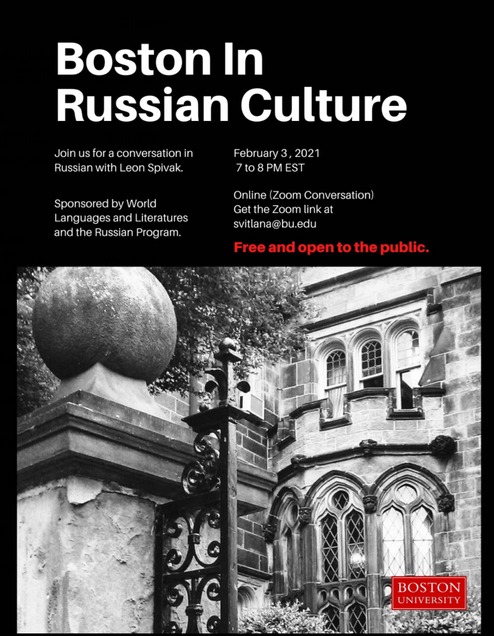
February 10. Queer Chinese Cultures and Mobilities: Kinship, Migration, and Middle Classes. 4:00-5:30pm.
February 11. Stories from the Square: Remembering Egypt's 2011 Uprising. 4:30-5:30pm.
Please join us for a special event next Thursday featuring three brilliant young BU faculty members – including our very own Ustaaz Abdulrahman – who will share their experiences and analysis of the 2011 uprising in Egypt. Get the Zoom link at https://tinyurl.com/Storiesfromthesquare
To learn more, before or after the event you can also stream Jehane Noujaim’s award-winning documentary The Square at https://bu.kanopy.com/node/217641.

March 4. Soviet Glamour. 7:00-8:00pm EST.
This event is free & open to the public. Please email svitlana@bu.edu to register and obtain the Zoom link.

March 5. Flowering Tales: Women Exorcising History in Heian Japan. 5:30-7:00pm
New Books in East Asian Literature
The 2020-2021 theme: Kinship, Sexuality, and Emotions
……………………………………….
Flowering Tales: Women Exorcising History in Heian Japan
Friday, March 5, 5:30 pm to 7 pm (EST)
Takeshi Watanabe (Wesleyan University)
https://bostonu.zoom.us/meeting/register/tJwqf-GgrDkqH9RPSWTiuhv64tkNmCetVpcJ
Telling stories: that sounds innocuous enough. But for the first chronicle in the Japanese vernacular, A Tale of Flowering Fortunes (Eiga monogatari), there was more to worry about than a good yarn. The health of the community was at stake. Flowering Tales is the first extensive literary study of this historical tale, which covers about 150 years of births, deaths, and happenings in late Heian society, a golden age of court literature in women’s hands. Takeshi Watanabe contends that the blossoming of tales, marked by The Tale of Genji, inspired Eiga’s new affective history: an exorcism of embittered spirits whose stories needed to be retold to ensure peace. Tracing the narrative arcs of politically marginalized figures, Watanabe shows how Eiga’s female authors adapted the discourse and strategies of The Tale of Genji to rechannel wayward ghosts into the community through genealogies that relied not on blood but on literary resonances. These reverberations, highlighted through comparisons to contemporaneous accounts in courtiers’ journals, echo through shared details of funerary practices, political life, and characterization. Flowering Tales reanimates these eleventh-century voices to trouble conceptions of history: how it ought to be recounted, who got to record it, and why remembering mattered.
Takeshi Watanabe is an associate professor of East Asian Studies at Wesleyan University. He received his B.A. in 1997, and his Ph.D. in 2005 in pre-modern Japanese literature from Yale University. He has taught as Visiting Assistant Professor at Connecticut College from 2007-2014, and at Wesleyan University from 2012-2014. His current book project is on representations of food and consumption in pre-Edo Japan. He is also starting a translation of The Tale of the Hollow Tree, which contains descriptions of banquets and is one of the earliest, lengthy monogatari predating The Tale of Genji. Although he is pet-less now, he likes corgis and, similarly, likes to eat.
** New Books in East Asian Literature is a forum to explore issues, concepts, and theories related to the study of East Asian literature. We are not only asking how to study East Asian literature beyond the paradigm of area studies, which originated from and is still often being linked to Cold War politics, but also seeking to look beyond the Euro-centric frame of traditional comparative literature. In other words, how can we decolonize the study of East Asian literature?

March 9. Holocaust Genocide and Human Rights Encounters: Stories from Armenian Women in Istanbul. 7:00-8:15pm.
Voicing and Silencing the Memory of Loss: Lullabies and Stories from Armenian Women in Istanbul
This talk will illustrate the capacity of the lullabies sung by Armenian women in Istanbul to produce knowledge, a knowledge that is intimate and affective, bodily and instantaneous. It is a way of knowing “otherwise” that has the potential to form alternative ways to relate with this “history”.

March 10. Life Stories (in Russian). 7:00-8:00pm.
Join us for a conversation in Russian with medical doctor, Harvard professor, poet, & songwriter/performer, Dr. Slava Gaufberg. This event is free an open to the public. Please email svitlana@bu.edu to register and obtain the Zoom link.

March 12: Honoring Eve, Tenth Annual Sedgwick Lecture: The Epistemology of the Pandemic: Contagion, Control, Community. 11:00am
Please join us for
The Tenth Annual Eve Kosofsky Sedgwick Lecture:
The Epistemology of the Pandemic:
Contagion, Control, Community
A Virtual Symposium
Presented by the Boston University Gender & Sexuality Studies Group
www.bu.edu/honoringeve

March 23. Known and Strange Things - An Evening in Conversation with Teju Cole. 6:00pm EST
“Known and Strange Things” – An Evening in Conversation with Teju Cole
Date: 3/23/2021
Time: 6:00 p.m.
Registration: tejucolebu.eventbrite.com
Boston University’s Conversations in the Arts & Ideas
This year’s BU Conversations in the Arts & Ideas series welcomes the prodigious novelist, critic, and photographer Teju Cole to Boston University to discuss his work. Questions from the audience will follow. This virtual conversation will be moderated by Crystal Williams, Vice President and Associate Provost for Community & Inclusion, and introduced by Harvey Young, Dean, College of Fine Arts. Cole’s Known and Strange Things, a collection of essays on art, literature, photography, and politics, was published by Random House (US) and Faber & Faber (UK) in 2016. It has been translated into German and Dutch, and is forthcoming in other languages.
Teju Cole was born in the US and raised in Nigeria—a biographical fact that informs much of his work. His first novel, Open City, won the PEN/Hemingway Award. His second, Every Day Is for the Thief, was named a Book of the Year by The New York Times. In 2017, Cole produced Blind Spot, a synthesis of written observations and travel photography. Most recently, he published a photobook of Switzerland, Fernweh, which appeared in February 2020.
The event is sponsored by the BU Center for the Humanities, Kilachand Honors College, Office of the Provost, CAS Dean’s Office, Elie Wiesel Center for Jewish Studies, BU Arts Initiative, and CAS Core Curriculum.

March 24. Holocaust Genocide and Human Rights Encounters: Holocaust Memory and Britain's Religious-Secular Landscape. 4:00pm.
March 24. Chernobyl Prayer, a Discussion of the Book by Svetlana Alexievich. 7:00pm EST
Please email svitlana@bu.edu to register and obtain the Zoom link.
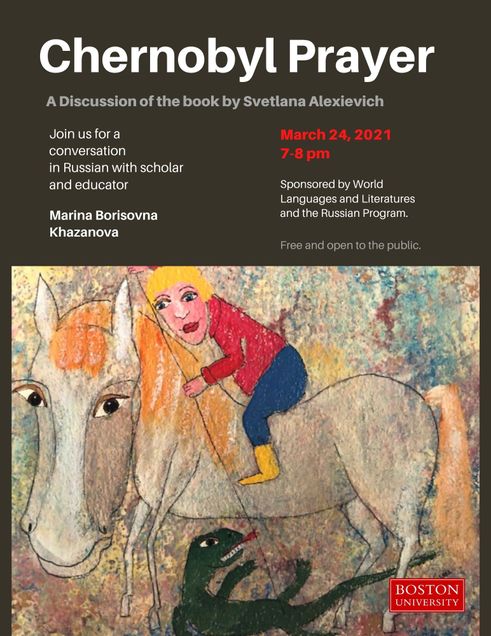
March 26. Elena film discussion with Dr. Malykhina. 4:00pm EST
Please email svitlana@bu.edu to register and obtain the Zoom link.

April 7. Russian Genius Loci of Boston. 7:00pm-8:00pm.
This event is conducted in Russian. Please email svitlana@bu.edu to register and obtain Zoom meeting link.
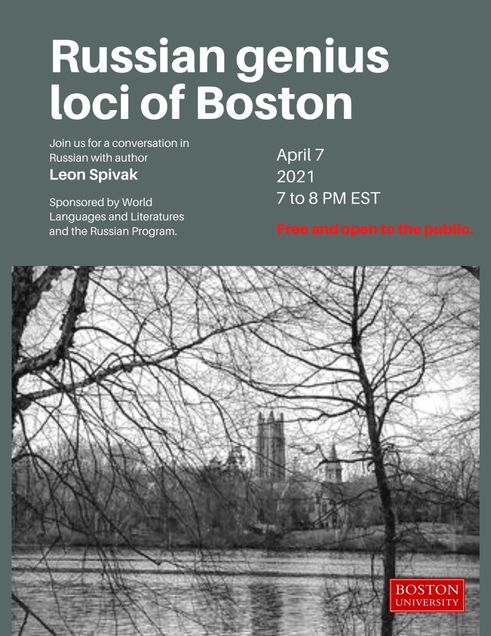
April 14. Kinship Novels of Early Modern Korea: Between the Genealogical Time and the Domestic Everyday. 11:00 am-12:30 pm
Ksenia Chizhova
Assistant Professor of Korean Literature and Cultural Studies
Department of East Asian Studies
Princeton University
https://bostonu.zoom.us/meeting/register/tJAvduisrTgvG9NQkt2MjD3nXUhP5f3aruW4
Violence and bloody family feuds constitute the core of the so-called lineage novels (kamun sosŏl) that circulated in Chosŏn Korea from the late seventeenth to the early twentieth century. Such subject matter becomes ever more puzzling when we consider that the main audience for these texts were elite women of Korea, who were subjected to exacting comportment standards and domestic discipline. Coeval with the rise and fall of Korean patrilineal kinship, these texts depict the genealogical subject—emotional self socialized through the structures of prescriptive kinship, but kinship itself is treated as a series of conflicts between genders and generations.
This talk will contextualize lineage novels and the domestic world in which they were read within the patrilineal transformation of the Chosŏn society and the emergence of elite vernacular Korean culture, patronaged by elite women. The proliferation of kinship narratives in the Chosŏn period illuminates the changing affective contours of familial bonds and how the domestic space functioned as a site of their everyday experience. Drawing on an archive of women-centered elite vernacular texts, this talk uncovers the structures of feelings and conceptions of selfhood beneath official genealogies and legal statutes, revealing that kinship is as much a textual as a social practice.
Bio: Ksenia Chizhova is an Assistant Professor of Korean Literature and Cultural Studies at Princeton University. Her main research interests include history of emotions, family, and writing in Korea, between the late seventeenth and twentieth centuries. Her most recent research project grows out of her continued fascination with vernacular Korean calligraphy and traces the shifts in contexts and infrastructure of graphic media that shaped the visual aesthetics of the Korean script, from the 17th century calligraphic practice to the contemporary fonts and graphic design in the two Koreas.
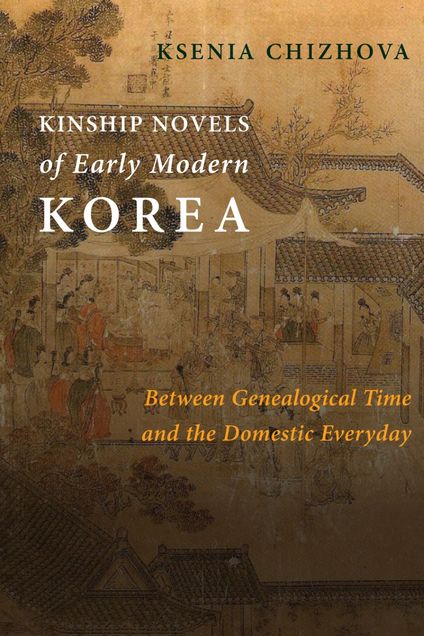
April 14. Holocaust Genocide and Human Rights Encounters: New Rwanda's on-going Campaign Against Genocide Ideaology. 4:00pm.
FALL 2020 EVENTS
October 5. A Night of Japanese Traditional Music with Master Kouzan Oyama of Shishido. 7:30pm EST
A Night of Japanese Traditional Music with Master Kouzan Oyama of Shishido
Monday, October 5 at 7:30 pm Eastern/6:30 pm Central/5:30 pm Mountain/4:30 pm Pacific
https://japansocietyboston.wildapricot.org/event-3970339
Please join us for a musical night to remember with Kouzan Oyama (小山貢山)!! Master Kouzan is a Tsugaru-Jamisen (a type of shamisen, or three-stringed Japanese guitar) player, master teacher, and two-time winner of the Tsugaru-Jamisen World Championships. In this fascinating workshop, Master Kouzan will showcase the allure of traditional Japanese music by demonstrating the Tsugaru-Jamisen, the koto (Japanese horizontal harp) and Okinawa sanshin (three-stringed Japanese banjo). Learn about the differences between traditional Japanese instruments (wagakki) and Western instruments, and enjoy a performance of Japanese wagakki online!
October 19-23. BU Arts Initiative host internationally recognized hip-hop dancer, choreographer, and teacher, Amirah Sackett.
In collaboration with the BU Dance Program and The Dance Complex, the BU Arts Initiative is honored to host internationally recognized hip-hop dancer, choreographer, and teacher, Amirah Sackett, in-residence at Boston University from October 19-23, 2020.
Please join us for these three exciting upcoming events – free and open to all.
October 19 – Hip Hop Dance Workshop
Participants will have the opportunity to explore the physical movement elements of hip-hop culture, as Amirah teaches the foundational movement styles of top rocking, breaking, popping, and tutting.
Develop a better understanding and appreciation for hip-hop history and culture in this action packed workshop.
Sign-up here to participate
October 21 – Dance & Spirituality: Panel Discussion
As spirituality is explored in dance across cultures, we are honored to have Amirah joined by Shreelina Ghosh (Assistant Professor, English, Gannon University), Ty Defoe (Writer and Interdisciplinary Artist) and Carrie Preston (Professor of English and Women’s, Gender, & Sexuality, and Director of Kilachand Honors College, Boston University) for this virtual panel discussion.
Sign-up here to participate
October 23 -Lecture & Demonstration
As a culmination to her residency at BU, Amirah will discuss the misconceptions about Islam and Muslim Women, and share her personal experiences participating in hip-hop culture around the world and the reasons she began melding her Muslim and American identities in her work.
Additionally, she will share a live performance of her work, including her new work combining the poetry of Rumi with the sound design of Chicago DJ, Nevin S. Hersch, and the cinematography talents of Tunisian filmmaker, Ahmed Zaghbouni.
Sign-up here to participate
November 17. Orthodox Passions: Rewriting the History of Emotions in Late-Imperial China. 4:00-5:30pm
Orthodox Passions: Rewriting the History of Emotions in Late-Imperial China
Maram Epstein (University of Oregon)
Tuesday, November 17, from 4 pm to 5:30 pm (EST)
https://bostonu.zoom.us/meeting/register/tJUrde2prjIvG9wBkSQnhbJ0wwnicUB0PiZv
The basic goal of Orthodox Passions: Narrating Filial Love during the High Qing (Harvard University East Asian Series, 2019) is to decenter romantic love as the normative translation of qing 情 in histories of Chinese emotion. By drawing on a wide range of sources that go beyond the usual cult of qing canon, I seek to challenge the May Fourth paradigm that continues to frame filial piety as a repressive ritual obligation that undergirded the despotic system of government and social order in imperial China. May Fourth attempts to produce an enlightenment modernity created the useful fiction of a monolithic feudal tradition that needed to be discarded, and filial piety was just one of the many traditional values that was declared to have no place in the modern. This view has been so dominant that for most of the twentieth and twenty-first centuries late-imperial formations of filial piety have received little critical attention. Orthodox Passions reframes the current understanding of filial piety by arguing that it should be understood not as an externally imposed set of ritual practices but as a deeply interiorized emotion that functioned similarly to love in the European west in articulating a self with affective and ethical agency.
In addition to giving an overview of the book and its interdisciplinary methodology, I will discuss its implications for analyzing the embrace of the modern concept of “love” 愛 in China’s early 20th century.
Sponsors: BU Center for the Humanities, Department of World Languages & Literatures, and BU Center for the Study of Asia

November 21. Breaking Boundaries, Promoting Asian Awareness and Praising Inclusion. 1:00pm.
On Saturday, November 21st, the BU Asian Student Union will be hosting a virtual speakers’ series called Breaking Boundaries on Zoom. They will present a set of influential speakers who promote Asian awareness and praise inclusion, including Philip Wang, Asian Boss Girl, and Sujata Day.
“We hope to bring attention to innovative new ideas and inspire students to find new ways to tackle their goals, whether they be career-oriented or otherwise. We hope to provide a platform to showcase stories from these Asian trailblazers and to shed light on the impact that they have made within their industries to spark conversation among our community.”
Eventbrite: breakingboundaries2020.eventbrite.com
Facebook event: https://fb.me/e/1fd0OJQ5z

February 10. Queer Chinese Cultures and Mobilities: Kinship, Migration, and Middle Classes. Time TBA.
Queer Chinese Cultures and Mobilities: Kinship, Migration, and Middle Classes
John Wei (Media Design School, New Zealand)
Wednesday, February 10 (time and Zoom registration link, TBA)
March 5. Flowering Tales: Women Exorcising History in Heian Japan. 5:30-7:00pm
April 17. Kinship Novels of Early Modern Korea: Between the Genealogical Time and the Domestic Everyday. 11:00 am-12:30 pm
SPRING 2020 EVENTS
Translation Seminar lectures scheduled to take place this semester will be accessible online. Videos of the lectures will be uploaded soon. Click here to join the Q&A sessions with the Guest speaker each week starting at 2:00pm. The speakers and abstracts for upcoming lectures for the remainder of the spring semester can be found here.
All past CAS XL 540, Translation Seminar lectures, can be found here.
The Global House has converted its cultural events into online presentations. All cultural presentations, past, present, and future can be found on their website.
Museum of Fine Arts Lecture Series. Click here to view the lectures.
Harvard Art Museum, Painting Edo: Japanese Art from the Feinberg Collection. Click here.
Tuesday, April 21, 6:30 PM: Poetry Is Not a Luxury: A (Virtual) BU Student-Faculty Forum. A Howard Thurman Center event with Robert Pinsky, Margaret Lee, Kenneth Elmore, and Crystal Williams. Moderated by Virginia Sapiro. Click here to access Zoom registration information
Monday, April 27, 4:30-5:30pm: Global Music Today. Our panelists will discuss what is global music and its place in culture, plus they’ll share what’s new and hot for you to check out and how you can broaden your playlists with some outstanding music. Participants will also have a chance to ask questions and share their favorite global music artists! Click here for more information and to register.
Through May 17, 2020: Boston Theater Marathon XII: Special Zoom Edition. Daily 10-minute readings at noon, hosted and organized by the Boston Playwrights’ Theatre. Readings of plays by New England playwrights. More information about each event can be found here.
Below is a list of additional past recordings that can count towards WLL’s culture pass requirement.
September 28-29, 2018. Translation NOW Conference.
Click here to view recordings from the event.
Click here to view the full conference page.
Translation Now celebrated the fortieth anniversary of the Seminar by bringing to Boston some of the most distinguished translators and scholars in the field today. The conference began with a keynote address by Rosanna Warren, who gave the Seminar its current shape and taught it until 2012. Professor Warren’s keynote was followed by a series of moderated conversations on key issues in literary translation.
April 7, 2018. The Brothers Karamazov.
WLL read The Brothers Karamazov together as a department. Click here for information about this conference and to see the video recordings from the event.
October 12, 2017. Haiku as World Literature Symposium: Celebrating Masaoka Shiki's 150th Birthday
Click here for the full event page with video recording.
Haiku is perhaps the best travelled of all world literary genres. Since the seventeenth century, when Matsuo Bashō wrote his masterpiece, The Narrow Road to the Deep North, haiku poets have embarked on countless figural and literal journeys, and they have taken the genre with them. By the eighteenth and nineteenth centuries, dense social networks of haiku poets crisscrossed the whole of Japan, and by the early twentieth century, haiku in its modern form had spread across the globe through the work of poets including Ezra Pound, Rabindrath Tagore, Frederico Garcia Lorca, and Yu Ping Bo. Today millions of people write haiku in Japanese and dozens of other languages.
This symposium marks the 150th anniversary of the birth of the haiku poet Masaoka Shiki (1867-1902). Despite spending the last seven years of his life immobilized by tuberculosis, Shiki contributed more than any other poet to the genre’s emergence as a globe-trotting literary form. Scholars and poets working on haiku in Japanese, English, Persian, Chinese, and Spanish shared their work on Shiki and on the poetics of haiku in its global dimensions.
October 27-28, 2017. In Search of New Horizons: One Hundred Years of Modern Korean Literature. 8:40am-6:00pm. PHO Colloquium Room.
Click here to watch video recordings of this conference. You will need your BU username and Kerberos password to watch.
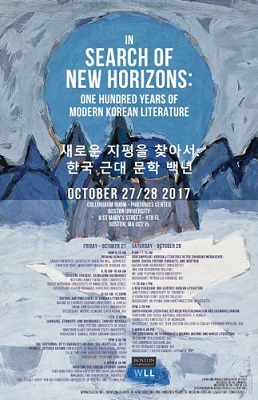
Click Here to view the event schedule and more information about the conference.
November 5, 2016. Tale of Genji Symposium
Click here to see more information about this event, including conference recordings.
BU faculty from WLL, Art History, English, and Romance Studies joined together on November 5th, 2016 for an interdisciplinary symposium celebrating a new translation of on the world’s first novel written by a woman: Lady Murasaki’s 11th century Tale of Genj.















